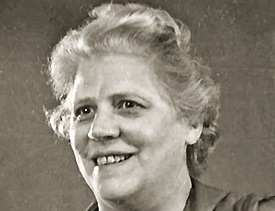Käthe Kluth Junior Research Programme
The Käthe Kluth Junior Research Group aims to actively support your research during the postdoctoral phase, helping you to increase the visibility of your research achievements and develop your academic career. The programme will help to enhance your profile as an outstanding early-career researcher. You will conduct an individual research programme, which will also serve as the basis for a habilitation or equivalent qualification. You will be able to increase your publication performance in terms of quality and quantity and apply for high-profile project funding during the funding period.
Furthermore, you will open up the opportunity for a doctoral candidate to write a thesis in close cooperation with you as head of the junior research group. In this way, you profit from gaining leadership experience and expanding your own research.
Käthe Kluth

Käthe Kluth (1899-1985) studied English, German and History in Stralsund and Rostock and obtained her PhD at the University of Greifswald in 1927. Between 1930 and 1946 she worked as a teacher at the secondary school in Pasewalk. During the following six years (1946-1952), Kluth worked as a lecturer and language teacher for English at the University of Greifswald, where she played a decisive role in the establishment of the Department of British and North American Studies. In 1952 she became the first female professor at the Alma Mater with a teaching contract for English Studies at the Faculty of Arts and Humanities. From 1956 onwards, she was head of the Department of English. Three years later, she was appointed a professorship with a full teaching contract. Prof. Dr. Käthe Kluth was appointed emeritus professor in 1962.
Award winners
In the current funding period, and for the first time, two outstanding female researchers from University Medicine Greifswald and the University of Greifswald were awarded the leadership of a Käthe Kluth Junior Research Group. JProf. Marie-Luise Kromrey (Institute of Diagnostic Radiology and Neuroradiology, University Medicine Greifswald) was successful with her research concept for a Käthe Kluth junior research group on the topic of “4D flow MRI in liver imaging”. “With the help of the new MRI method of 4D flow measurement, morphological representation, quantification and analysis of flow conditions in vessels have become possible. For example, flow velocity, volume, direction, wall tension, pressure gradients and complex flow patterns can be determined and visualised in an impressive way. At present, 4D flow measurements are only being used for clinical decision-making in a few hospitals in Germany. The main area of application to date has been the heart and vessels close to the heart, but current work is increasingly focussing on the transfer to abdominal vascular systems, such as the liver,” says Prof. Kromrey in her project description.
Dr. Giovanna Caruso’s junior research group (Department of Philosophy, University of Greifswald) is investigating the relationship between the human and the non-human under the title “Structures of the Given. Phenomenological Approaches to the Interrelationships of Object, Nature and Human”. The starting point is the current revival of social and philosophical interest in objects and the criticism of the Western philosophical tradition of making the non-human dependent on subjective structures. The central thesis is that the irreducible diversity of reality and therefore the relationship between artefacts, natural objects, non-human living beings and humans can be explored through a phenomenological approach that expresses the structures of these interrelationships on the basis of the given. Finally, the exploration of these structures should also lead to the identification of new challenges that ethics, politics and economics will have to face in the future.
Former award winners
- 2020: JProf. Dr. Paula Prenzel, Geography and Geology Greifswald
- 2019: Dr. Rieke Trimcev, Political Science University of Erlangen–Nuremberg
- 2017: Dr. Susanne Sievers, senior scientist, group leader and interim professor to cover Katharina Riedel at the Chair of Microbial Physiology and Molecular Biology, Microbiology Greifswald
- 2015: Dr. rer. nat. Antje Vogelgesang, University Medicine Greifswald [de]
- 2014: Prof. Dr. Christiane Pané-Farré, since May 2019 Professor of Clinical Psychology at the University of Marburg [de]
- 2013: Dr. Cristina de la Vega Leinert, Geography Greifswald [de]
- 2012: PD. Dr. Ekaterina Poljakova, Philosophy Greifswald [de]
- 2012: Prof. Dr. Klavdia Smola, since 2018 Professor of Slavic Literatures and Cultures at TU Dresden
- 2011: Dr. rer. med. Nele Friedrich, Biomathematics/University Medicine Greifswald [de]
- 2011: Prof. Dr. Kerstin Knopf, since 2015 Professor of Postcolonial Literary and Cultural Studies at the University of Bremen [de]
- 2011: PD Dr. med. habil. Pia Menges, medical expert in the field of medical law for the Bavarian Medical Service [de]
- 2010: PD Dr. Tanja Pfeiffer, Botany Greifswald
- 2010: Dr. Nicola Neumann, Psychology Göttingen [de]
- 2010: Prof. Chiara Piazzesi, since 2013 Professor of Sociology at the University of Québec [fr]
- 2008: Prof. Dr.rer. nat. habil. Haike Antelmann, since 2015 Professor of Microbiology at FU Berlin
- 2007: PD Dr. rer. nat. Heike Kahlert, Chemistry Greifswald
